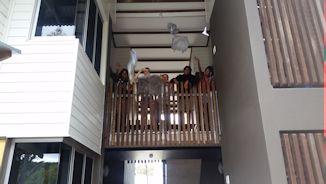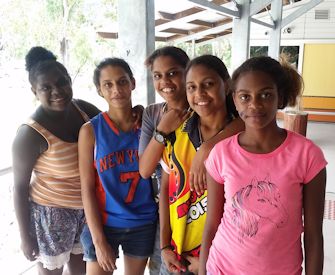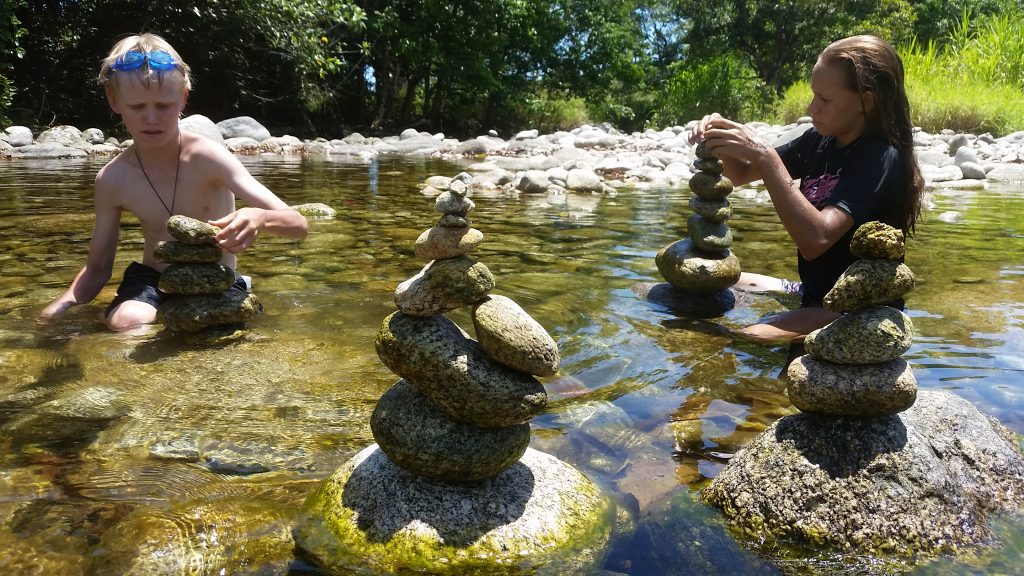The young person is at the centre of our work at Holy Spirit College. It is the relationship with staff, whether they are the Teacher-mentor, Principal, Head of Campus or support staff that is the cornerstone of a young person’s success and development. It is critical that each young person feels known and appreciated by the staff. Our attention to the whole person is essential and facilitates a rapport which leads to personal growth and the development of individual future goals.
Our College respects the essential uniqueness of each person, yet acknowledges the bonds that bind us to one another. We acknowledge that the young people we are responsible for, have been negatively affected by many forces, most beyond their control. However, we believe in great things for the young people and hold realistic expectations of their capacity to overcome and to succeed.
In this light, individual care is a major driving force behind our program at Holy Spirit College and permeates all our initiatives. Our mission statement reflects this by:
Valuing each young person’s individuality with their particular and different abilities and needs.
Encouraging all individuals to recognise their potential.
Valuing excellence in the pursuit of all aspects of life.
Individual care enables the young people to develop a sound understanding of expectations and boundaries. It provides the external support structure to internalise positive behaviour patterns and self discipline. Clear communication of expectations and consistent application of these are the keys to success and make for a safe environment to learn and develop.



The well-being of young people and support at Holy Spirit College ensures each young person’s individual issues and barriers are addressed to provide maximum opportunity for their participation, engagement and improvement. We work, in a holistic manner, with each young person’s parents/carers and other support agency representatives to address their emotional, physical, psychological and spiritual needs.
Support is extended to the families as well as the young people and goes beyond the gates of the college or the time a young person is with us; when people leave Holy Spirit College, our Student Services Team work to support them and their families to transition to the next phase of their lives.
Apart from collaboratively working with families and agencies, the primary role of the staff at Holy Spirit College is to provide guidance to the young people in our care. Each young person has a staff member assigned to them at the commencement of their enrolment. The staff member makes contact with the young person on a regular basis. The regularity is dependent on the student’s circumstances and the approach of the staff member is influenced by other professional services the young person’s contacts inside and outside of the school. We aim to establish a complementary approach which integrates the various services that are supporting the young person.
The staff are involved in every facet of the program at Holy Spirit College; this includes participation and organisation of programs, camps, excursions, College days, and work experience. The student support staff regularly liaise closely with the principal and teachers, in order to meet the social, emotional and personal needs of the young person. All teacher-mentors communicate with each other about young people and families. The continuous communication is essential for the establishment and maintenance of individual plans for each young person.
Mentors and support staff also communicate on a regular basis about young people’s progress; this relationship is the cornerstone of our well-being and pastoral care program. There are occasions where we utilise professionals outside of the school; in these instances, this is discussed with parents or carers and the young person prior to any intervention.
For young people who have negative experiences or perceptions of learning it is particularly important we maintain an environment which is both physically and psychologically safe. This means ensuring that equipment is appropriate to the capacity of learners and the physical space presents no hazards, it also means observing the class dynamic carefully for interpersonal issues and potential power imbalances.
Supporting our young people is the basis of the re-engagement programs and can require looking at a range of approaches from different viewpoints to address the significant barriers experienced by some learners. Learner support is also often one of the more challenging aspects of program delivery as it can require intense engagement, considerable investment of time and a network of dedicated teaching and support staff working together in order to be effective.
Student Services
“Dear young people, do not bury your talents,
the gifts that God has given you!
Do not be afraid to dream of great things!
”
Pope Francis
The primary role of all staff at Holy Spirit College is to provide guidance to the young people in our care. The team works collaboratively with the aim to establish a complementary approach which integrates the young person, family and the various government and non-government services that are supporting the young person. There will be occasions where we will utilise professionals outside of the school. We will discuss this with parents and young person prior to any intervention.
The whole staff are involved in every facet of the program at Holy Spirit College. This includes participation and organisation of Individual Learning Plans, social and emotional programs such as mindmatters, camps, excursions, cultural days and work experience.
The staff regularly liaise closely with the Principal and Head of Campus, in order to meet the social, emotional, mental and personal needs of the young person. Likewise, all staff regularly communicate with families and carers about young people and how they may positively support the young person’s learning. This communication is essential for the establishment and maintenance of individual plans for each young person and to achieve the goals set through the plans.
“Charity, patience and tenderness are very beautiful gifts.
If you have them, you want to share them with others!”
Pope Francis




